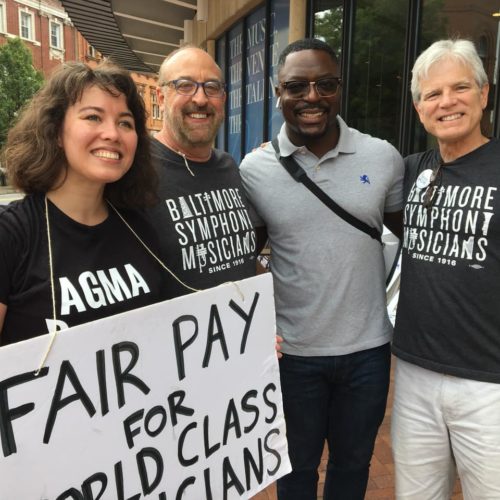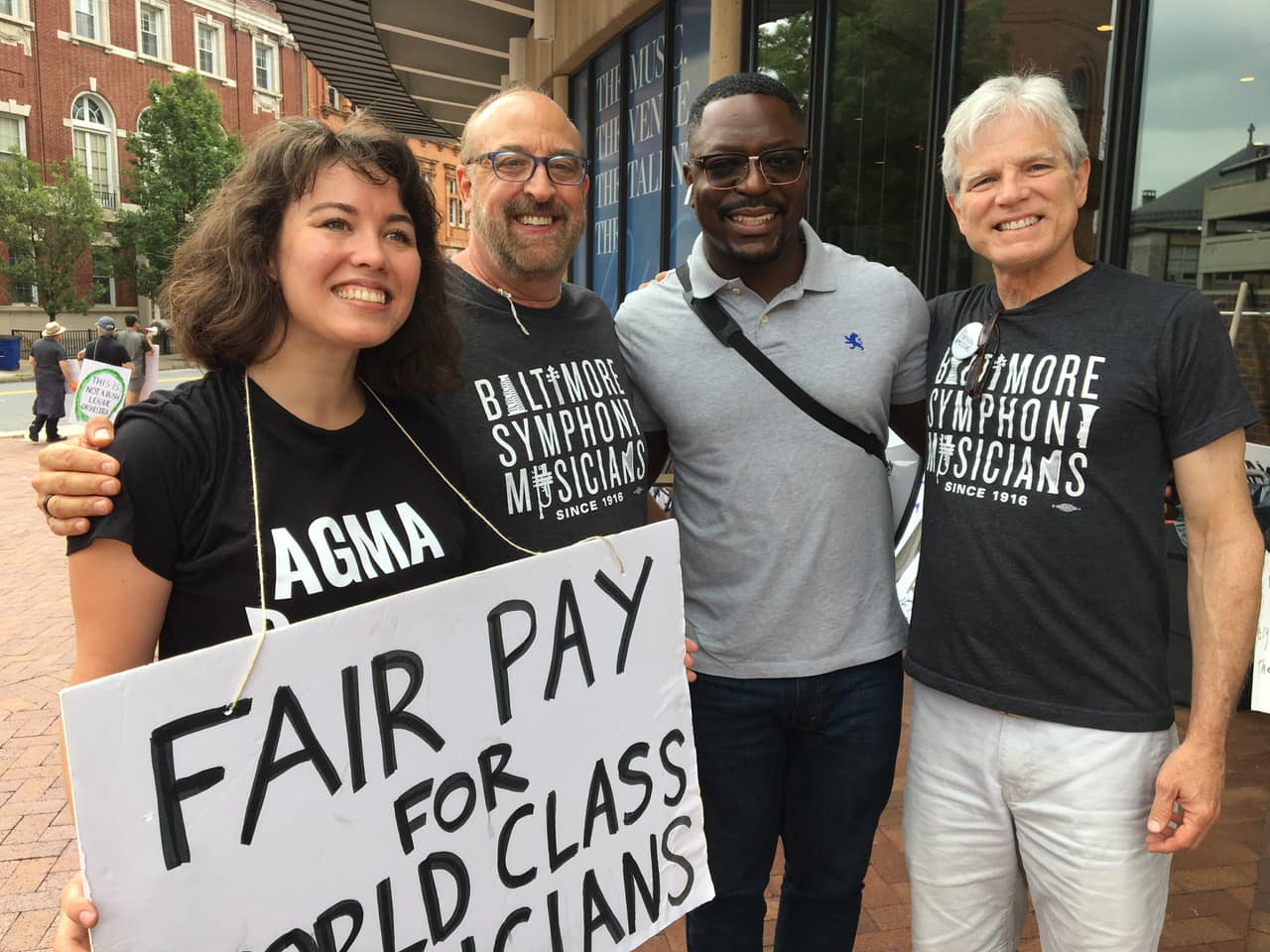Detroit musicians attack Baltimore distortions
mainMessage received:
The Musicians of the Detroit Symphony Orchestra, in solidarity with our Baltimore colleagues, have sent $10,000 to contribute to their cause.
It has been suggested by Baltimore Symphony Orchestra CEO Peter Kjome that several orchestras, including the Detroit Symphony Orchestra, have stabilized their financial situations by making cuts to the length of their seasons.
At best, Mr. Kjome has not done his homework; at worst, his comments are deliberately misleading.
Suggesting that an organization whose primary mission is to perform for and be accessible to its community can better serve those goals by performing fewer concerts is contrary to common sense.
The notion that individual donors, foundations, and government are willing to provide more support for an orchestra because it is doing less defies logic.
And the idea that musicians – who practice and stay in musical shape year-round regardless of an orchestra’s season length – would prefer to join or stay in an environment where their efforts are only valued for part of the year doesn’t add up.
The DSO’s financial footing has dramatically improved since a painful strike that ended in 2011 with several factors playing a major role in that turnaround. Significant structural changes to staff, board and development efforts took place, and more importantly, the DSO prioritized transparency and built trust: musicians are in the room for nearly every meaningful discussion about the orchestra’s future and have access to the organization’s complete financial picture, something that is not the case in Baltimore.
At the DSO, significant and necessary changes to organizational culture have made it possible to thrive in spite of a shortened season rather than because of it as Mr. Kjome has erroneously suggested. We hope to see similar changes in Baltimore before the current BSO administration does irreparable harm to one of Baltimore’s great assets.
Monica Fosnaugh, Detroit Symphony ICSOM Delegate, and the DSO Orchestra Committee







Didn’t the Detroit musicians take a huge pay cut in 2011 after their strike? It was reportedly an average cut of 25% They also had their season cut to 40 weeks.
“At the DSO, significant and necessary changes to organizational culture have made it possible to thrive in spite of a shortened season rather than because of it as Mr. Kjome has erroneously suggested. We hope to see similar changes in Baltimore before the current BSO administration does irreparable harm to one of Baltimore’s great assets.”
If the DSO statement is to be believed — and indeed if the final paragraph above is true — then the BSO could just as easily “thrive in spite of a shortened season rather than because of it.”
This is the key section, and this is what is missing from all of the communication I’ve seen coming from the BSO leadership, both in print and in several in-person conversations:
“The DSO’s financial footing has dramatically improved since a painful strike that ended in 2011 with several factors playing a major role in that turnaround. Significant structural changes to staff, board and development efforts took place, and more importantly, the DSO prioritized transparency and built trust: musicians are in the room for nearly every meaningful discussion about the orchestra’s future and have access to the organization’s complete financial picture, something that is not the case in Baltimore.”
Key words: CHANGES TO STAFF, BOARD AND DEVELOPMENT EFFORTS, TRANSPARENCY and TRUST. The current management and Board leadership has not been transparent and they have been completely unable or unwilling to provide details about what happens next to restore the BSO to a sounder financial footing after the drastic cuts. The BSO musicians have already voluntarily given up salary and benefits over the past years (which they will never recover), more than once, because they had faith that it was the right thing to do for the long-term health of the organization. But at this point, why would any rational person who has already voluntarily given up salary and benefits over the past decade be willing to do that again without being provided with a coherent and detailed plan for truly setting the organization on sound financial footing while maintaining the world-class quality of the orchestra? And why would any rational donor be willing to continue supporting a management and leadership that cannot provide such a plan? It’s condescending at best, and over the past several months of asking the question, I have come to the conclusion that in fact there IS no coherent, detailed, sensible plan.
I understand what you’re saying, Samira, and I can largely agree in principle. But constantly returning the subject in this way to the mendacity and unresponsiveness of orchestra management seems to be the comfort zone of player supporters, and I’ll express why that’s problematic when there are other factors in play.
Over and over again I’ve seen letters in support of the BSO musicians and without fail they follow this template: 1) I/we have been subscribers and donors for a hundred years; 2) Shame on management for cutting out concerts and other stuff; 3) Woe on management and the state for not valuing classical music which is the apex of humanity and so on.
What would be dramatically more effective at this point is even a single letter to the Baltimore Sun that said the following: 1) I just discovered the Baltimore Symphony Orchestra last year and gosh they’re really fantastic! 2) I sit in the LAST row and I am NOT a donor and I have NO extra money to contribute, but you politicians and management please resolve this and I promise to bring lots of my friends next season; 3) Keep rocking the various jazz and pop genres and kids programs as well, it’s all good!
Interestingly as I read it, you used to be that person (perhaps without #3 but that’s okay) according to your own letter to the editor, unless I have a mistaken identity. Assuming that you’re active in Save Our BSO, I would suggest to them that on their website, where it says “Write A Letter,” it should specifically solicit this different kind of supporter to speak out. In multiple threads here at Slipped Disc, there have obviously been questions about how truly organic the BSO support is in the often-referenced Baltimore area “community.” With BSO management now taking what certainly are shocking-looking steps in an obviously unyielding attempt to get the musicians to put concessions on the table, it’s almost past time to truly demonstrate the broad support for a full-year orchestra in a way that really works socially and politically. It might even be the kind of indication that “rational donors,” as you put it, are actually looking for. I hope this helps.
Andrew Carnegie was a champion of cost-cutting and innovation. Learn from that.
Any other Robber Barons you can suggest as role models?
While you’re at it, why don’t you tip your hat to Cyrus McCormick, George Pullman, and Marshall Field too? Punishing working people should never be confused with enlightened “innovation”.
https://www.baltimoresun.com/entertainment/bs-fe-bso-zinman-20190624-story.html?fbclid=IwAR1gebCeb_aAjZWzIypM0P6OsvwSXej-SifF_RVAeD8z_grbnRY7VbP3dC8
David Zinman, the former music director of the Baltimore Symphony Orchestra and a pivotal figure in the arts group’s history, visited the players’ picket line Monday to express his outrage at the efforts to shorten the orchestra’s season.
“I was shocked, mortified and horrified to hear what was happening,” said Zinman, the orchestra’s conductor from 1985 to 1998. He was wearing an old T-shirt that read, “Baltimore Symphony Orchestra: The Sounds of Summer.”
Retired BSO trombone player Jim Olin (left) talks with former BSO conductor David Zinman on the pick
Retired BSO trombone player Jim Olin (left) talks with former BSO conductor David Zinman on the picket line at the Myerhoff Monday morning. The Baltimore Symphony Orchestras management has locked out the musicians during the latest contract negotiations. (Jerry Jackson / Baltimore Sun)
Though the warm month concerts began long before Zinman arrived in Baltimore, strengthening the summer season was a hallmark of his tenure.
“It would be like telling the Baltimore Orioles, ‘Take 40 games away from your season. You’ll be a minor league team, but it doesn’t matter.’” he said.
“This is a major league orchestra and it’s meant to stay that way. A long time ago, I spent 10 years blowing up a balloon. And now the balloon has been popped and everything is falling out.”
Zinman placed his hand over his heart and added, “it pains me to see this.”
He was reacting to a rancorous labor dispute that has erupted between the Symphony’s management and its 76 musicians, who Monday began their second week of being locked out of Meyerhoff Symphony Hall. The musicians had worked for four months without a contract, which expired in January.
“We have great admiration and deep respect for our former Music Director David Zinman,” Peter Kjome, the symphony’s President and CEO said in an emailed statement. “We appreciate his concerns over our current situation, but unfortunately those concerns do not change the facts about our financial circumstances.”
The organization announced in late May that it was cancelling its summer season for financial reasons. Citing deficits that have totaled $16 million in the past decade, symphony management has proposed a new contract that would include a roughly 20 percent pay cut for musicians but retain health insurance and other benefits year-round. The changes would have minimal impact on audiences, the organization has said, because the reductions would occur during the summer when traditionally few concerts are performed.
How the Baltimore Symphony Orchestra found itself in trouble
The musicians have proposed a “status quo” contract, according to Greg Mulligan, co-chair of the Players Committee, that would continue the 52-week season that has been in place since 1984. In addition, the musicians are seeking a cost of living raise and to increase the total number of musicians to 83, the level that Mulligan said was specified in the most recent contract.
Zinman, now 82, lives in New Jersey with his wife, Mary, who formerly played viola for the BSO. The couple stopped off at Meyerhoff Symphony Hall on their way home after a trip to Virginia.
“It’s unbelievable that this could be happening to an orchestra of this caliber,” she said. “It’s just ridiculous.”
Their arrival shortly after 9:30 a.m. was an emotional moment for the musicians. Of the roughly 100 people on the picket line, more than two dozen had formerly played for Zinman. Some cried.
It was under Zinman, Mulligan said, that the orchestra achieved an international reputation. In 1987, the BSO became the first orchestra to tour the former Soviet Union in almost 12 years.
Zinman also launched an ambitious series of recordings, for which the BSO won its first Grammy Award in 1990. The award-winning series featured a recording on Sony Classical of the orchestra performing Benjamin Britten’s Cello Symphony and Samuel Barber’s Cello Concerto with the superstar cellist Yo-Yo Ma, an old friend of Zinman’s.
“That’s the man who hired me when I was 21 years old,” said Ivan Stefanovic, the associate principal violinist who walked the picket line Monday with the youngest of his three sons.
“I began working for the BSO on Jan. 2, 1991. Six months later, civil war broke out in Yugoslavia. I had been told that I was destined for the Yugoslavian special forces. I don’t know if David Zinman saved my life. But, he definitely saved me from fighting in a civil war.”